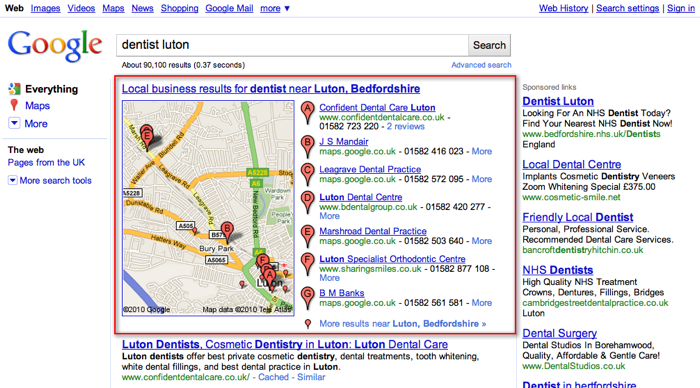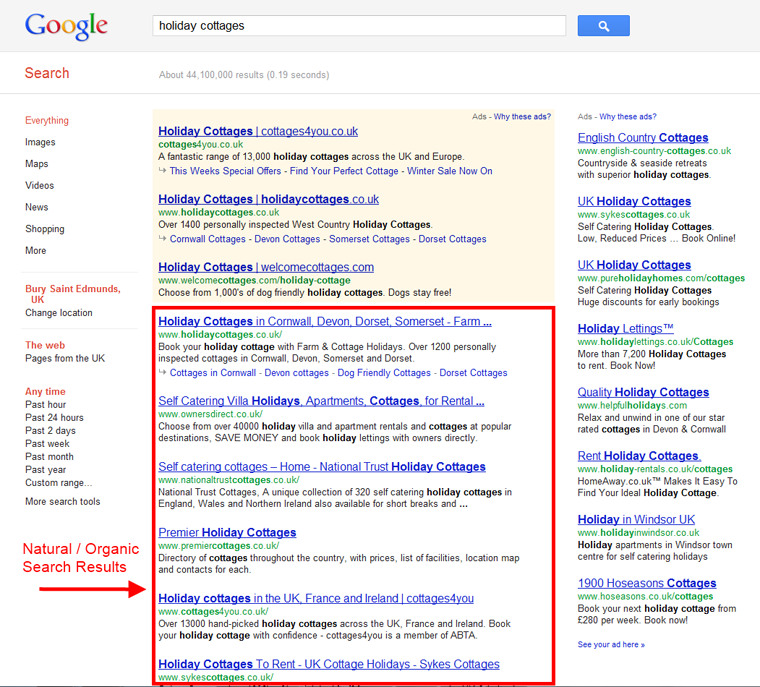Small Business SEO
The object of this article on the subject of small business SEO is not to delve into the complexities of search engine optimisation, but more to provide a ‘starter for 10’, for those business owners looking to get one step ahead of their local competition!
For many small businesses the rewards for higher visibility in the search engines (Google; Bing and Yahoo) can be measured in increased numbers of new customers, higher turnover and greater profit.
For these reasons many successful and local smaller businesses will undertake a targeted campaign of small business SEO to help drive website visitor numbers. Because the majority of small companies will operate in a specific geographic area (normally close to their operating base), getting your website in front of potential near-by customers and clients, before your competition is crucial to long term success.
Understanding the basics of small business SEO is essential to maximising traffic to your site and therefore making more sales or creating more leads. So, where do we start?
Google Places
When searching in Google for a type of service or product in a particular location, say for example ‘electrician London’, Google will deliver it’s Google Places or Maps listings near the top of the 1st page of results. You can see an example of these listings in the example below, illustrated by the red border:

In the example above we can see that the Google index delivered a total of 90,700 results for the search ‘dentist Luton’. It’s clear then that gaining maximum local visibility in Google Places is a vital key to the success of your small business SEO program.
Google My Business
Google My Business puts your business info on Search, Maps and Google+ so that customers can find you, no matter what device they’re using. If you previously used Google Places for Business or Google+ Pages Dashboard to manage your business information, your account will have been automatically upgraded to Google My Business.
It is imperative that you ensure your business and website is fully represented across all FREE Google platforms. It is still the case that approximately 90% of persons in the UK going online to search for a business will Google it! Getting your business listed on Google Places with a website link and some customer reviews is THE place to START.
Search Engine – Organic Listings
Take a look at the image below and you can see page 1 of the Google index for the search ‘holiday cottages’. The Google SERPS (search engine results page) listings are shown in the red border. On each page of Google there are normally 10 organic listings displayed:

It is clear why having maximum visibility in the organic search engine listings can greatly assist in growing your small business. A BIG percentage of searchers will never go past the first page when searching for a suitable business to click through to and contact. Small business search engine optimisation can help in delivering the visibility and high ranking(s) you need to gain new customers and grow your company.
This is a good analogy: Think of Google as you would the British Library. Think of your website as a book. If I wandered into the British Library and wanted to find a book on the subject of ‘electricians in Crawley’, what chance would I have of finding your book if the book title was Home?
Answer – none. It might be surprising therefore to find that many small business owners still have the title of their website index page as Home, and can’t understand why they do not show up on the first page of the Google SERPS for what they do in their target area(s)! This ‘Title META Tag’ is a start-point for what is commonly referred to as on-page SEO. Other on-page factors can include:
• Updated Blog with Unique Content
• Google Authorship Integration
• Optimised URL’s
• Heading Tags
• Alt Image Tags
• Keywords in Content
• Sufficient Depth of Content
• Relevant Topical or Theme Targeting
Working in conjunction and harmony with your on-page (website) SEO, is unsurprisingly your off-page SEO. Now, don’t go thinking that all this technical talk is only for the BIG companies out there or those with HUGE search marketing budgets! Understanding where you NEED to get your business listed and having a grasp of how to do it are, in my opinion, becoming fundamental to the success of all small businesses.
It could be the case that your fiercest local competitor is using the services of a small business SEO agency or consultant, or possibly they have gleaned enough knowledge to be able to undertake their own campaign? Let’s then take a brief look at the off-page factors that can help rank your business higher in the organic listings:
• Links: Quality and Diversity beats Quantity
• Trust: Authority – Brand recognition and Author recognition
• Social: Connections and Interactions
• Personalisation: Country and Locality
Summary
Often, the most common reason for small business websites failing to generate FREE online click-throughs and subsequent revenue, is the failure to engage in a structured, ethical, on-going and professional SEO program.
As a small business owner it WILL be worth it’s weight in gold for you to take the time to grasp and implement some of the above small business SEO tactics and strategies. Read more about our SEO Sussex services for small businesses.
Paul Brewster, October 2014
